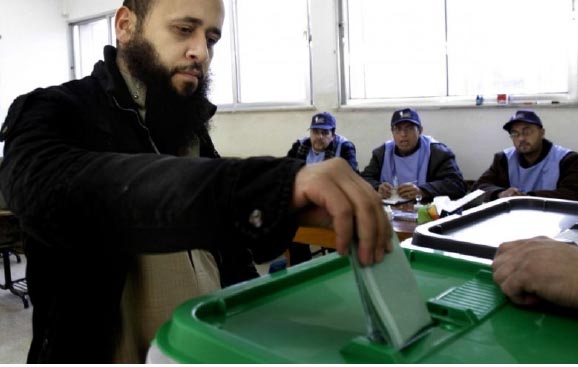Elections have become a major factor in the stabilization and democratization of emerging democracies and post-conflict countries. Hundreds of developed countries achieved their economic prosperity and political stability through democratic elections. On the other hand, in emerging democracies and post-conflict societies, it has a great potential risk to plunge a country back into violent conflict, to undermine processes of stabilization and to discredit democratization. The presidential elections in Afghanistan in autumn 2009 are one of the recent examples for this risk. Elections are not only a tool of democratic participation but also a severe contest for positions of leadership, power and access to resources.
However, we should not forget that there have been a number of (more or less) successful elections in post-conflict countries in the last decades, like those in Namibia, South Africa and Mozambique, Nicaragua, El Salvador, Cambodia, Sierra Leone, Liberia, the DR Congo as well as in Bosnia and Herzegovina, Kosovo and Macedonia on the Balkans. There is no iron law according to which elections are doomed to fail in war-torn countries and emerging countries. Elections can play a significant role in stabilizing and democratizing them if handled properly.
So, we need to highlight those political, structural and institutional lessons learned by most practitioners to be crucial for giving elections a chance to succeed in emerging democracies and war-torn countries, despite the enormous challenges the environment in these countries poses. There is no reason to give up supporting these elections. But the international community, not least the Western countries, have to take a clearer stand on what kind of elections they are ready to support, and which not. This concerns in particular the existence of certain key elements, like independent Election Commissions and functioning Electoral Complaint Systems. Without these elements the electoral process is in great danger of being manipulated by those who hold power, and therefore lacks credibility in the eyes of the population. The risk of destabilization or even return to war and violence is high.
In the early 1990s, with the Cold War over, a wave of democratization swept Africa, the Balkans and other regions of the world. It was very much energized by the expectation that the transformation to democratic rule would be accomplished speedily and without too many complications – despite the experience of most European countries to the contrary. Their struggle for democracy had been long, painful and fraught with bloody setbacks.
Also, the stalemate of last presidential election in Afghanistan is one of the recent cases for such risks. Afghanistan’s presidential election was marred by accusations of countless frauds. As a result U.S. Secretary of State John Kerry intervened and brought together the two candidates, Mohammad Ashraf Ghani and Abdullah Abdullah, to form what is now the National Unity Government (NUG), with Ghani serving as president and Abdullah as chief executive officer. The NUG is nothing more than a quick fix that undermines the country’s electoral institutions and processes. The fundamental reform of the Afghan electoral system prior to a new parliamentary election was a key part of the post-election power-sharing deal reached between President Mohammad Ashraf Ghani and Chief Executive Abdullah Abdullah but no important steps has taken place to ensure the transparency and restore the confidence.
The government’s cursory electoral reforms have still been limited to the replacement of election commissioners as none of key issues have been essentially resolved yet. For example, one of the major issues in need of reform has been voter registration. Afghan voters are currently not limited to voting in particular areas, meaning that they can use their 2001-issued voting cards in any polling station. Regardless of thousands of fake cards, there have been 3 major registrations since 2001, resulting in a total of 20 million election cards being distributed. In contrast, Afghanistan only has an estimated 12 million voters, making the number of cards in circulation a source of potential fraud. The other problem is that there has never been an accurate population census taken in Afghanistan. In spite of frequent outcry, the scheme of electronic ID card tactically has been deferred for the reason that it reveals that there is not a solitary ethnic group who form the absolute majority.
People point the finger at the international community because they did not bring enough pressure on the government to hold the election on time. The power-sharing agreement of the National Unity Government (NUG) was brokered by the international community, more particularly and predominantly the United States, United Nations and European Union so that is why they are also responsible for the implementation of the deal. They should have impelled the government to honour its commitments, especially those related to elections and electoral reforms. Given the dissatisfaction of people with the performance of both the Parliament and government, the fate of election should be ascertained and solid actions taken thereof. The postponement of election leads to more chaos and uncertainty, and erodes the public’s trust in election, which on no account serves the national interests.
Generally, the political management experience shows that only way to political and economic stability is transparent election system in a country. Heeding the imperatives and lessons learned by prosperous countries, of being key importance can contribute significantly to reducing these risks. Yet, carried away by abstract, resounding rhetoric on the need for democracy and free and fair elections, politicians and leaders in the Western capitals as well as in international organizations often fail to be serious about implementing them. This is particularly true with regard to safeguarding the independence and integrity of Election Commissions and Electoral Complaints Systems. As a final point, the negative fallout of the abuses during the 2009 Afghanistan elections should be a good lesson for all, particularly, for those who undertake this critical responsibility.
Home » Opinion » Role of Elections in Democratization
Role of Elections in Democratization
| Mohammad Zahir Akbari

